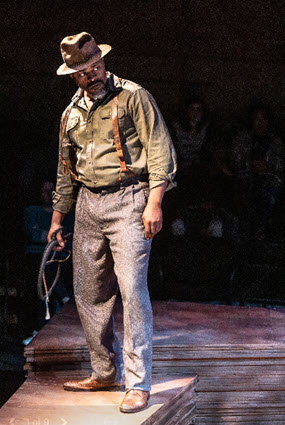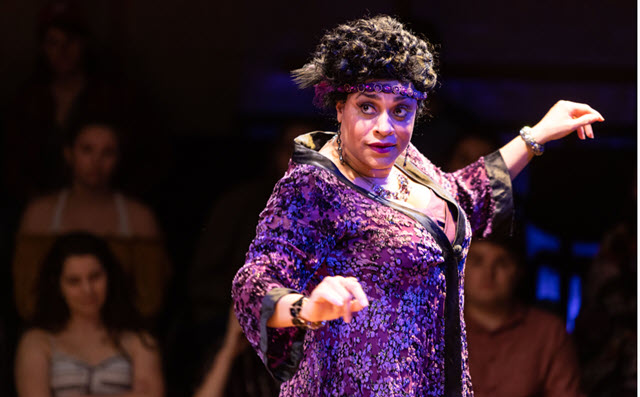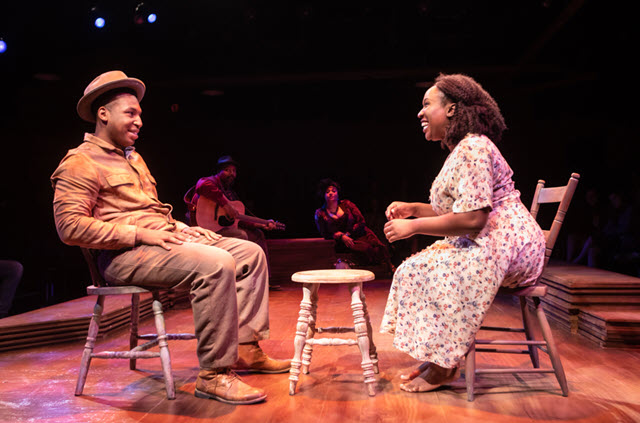Jordan Wright
May 14, 2019
Zora Neale Hurston’s exuberant play-with-music, Spunk, takes us into the African-American experience of America’s Deep South. It’s like gaining admission to a private club, not just to witness, but to experience full-on a sense of place that no longer exists. It doesn’t hinge on racism nor rely on oppression to tell its stories, though Hurston makes clear the characters have suffered from their legacy. Three distinctly different tales provide a glimpse into the colorful characters that peppered the African American communities of the 1930’s and 40’s. Part celebration and part revelation, part history and part Black culture, Spunk is the spinning of tales that claim a deep appreciation of a particular time and place.

KenYatta Rogers (Folk Man 1) in Spunk at Signature Theatre. Photo by Christopher Mueller.
“Blues, grits, spit, spunk and pain” describe the colorful activities and lively characters who weave in and out of one another’s lives. In Tale Number One: “Sweat”, there’s Delia, a washerwoman married to Sykes, a cruel drunkard whom she supports through “blood, sweat and tears” while he’s out messin’ with another woman. You can almost feel the steamy Florida summer heat when Delia sings “Dirty Water” as she exacts her revenge.

Ines Nassara (Folk Woman) in Spunk at Signature Theatre. Photo by Christopher Mueller.
In Tale Number Two: “Story in Harlem Slang”, we find Slang Talk Man and his cronies, Jelly and Sweet Back – zoot-suited men, called “Harlem pimps” whose only thoughts were of money, the lack of it, the allure of it, and how to get the domestics who bring their paychecks home on a Friday night to give it to them. Sweet Back, who’s always broke and “bug-a-booin’” while looking to score a fine lady, struts around in his finery with his pal, Jelly. The two are like a couple of banty roosters sizing up the barnyard.
Tale Number Three: “The Gilded Six-Bits” is a love story and by then we’re ready for it. Set in Chicago Missy May and Joe have their differences, but when a fast-talking grifter comes to town he turns Missy May’s head with the promise of riches, and the two lovers have to decide if they’ll stay together. “If you burn me down, you won’t get nothin’ but a pile of ashes,” Missy May warns him.

Marty Austin Lamar (Folk Man 2) in Spunk at Signature Theatre. Photo by Christopher Mueller.
Hip expressions and street corner colloquialisms keep the humor moving at a rapid clip. And between all the movin’ and groovin’, struttin’ and slipslidin’, there is music, wonderful bluesy music played by Guitar Man and sung by the players. Written by Chic Street Man a musician and Psychology grad who runs his own youth center and scored the music to this Broadway sensation, it uses some classic tunes as well as stylistically apropos music to reflect the period.

Iyona Blake (Blues Speak Woman) in Spunk at Signature Theatre. Photo by Christopher Mueller.
In granting these characters ethnically correct vernacular, Hurston gifts them with the unique personalities she knew and cherished – though if any writer but an African-American writer had told these stories, they would be tarred and feathered and run out of town on a rail. Hurston endured criticisms of these Black “caricatures”, even though she was steadfast in her belief that this time and place should not be forgotten. In the end, she chronicled a period in American folklore that is both historic and universal.

Sweet as cane sugar, sassy and funny with a polished and perfect cast.
With Iyona Blake as Blues Speak Woman, Jonathan Mosley-Perry as Guitar Man, KenYatta Rogers as Folk Man One and Fight Choreographer, Marty Austin Lamar as Folk Man Two, Drew Drake as Folk Man Three, and Ines Nassara as Folk Woman – all playing multiple roles.
Adapted & Originally Directed by George C. Wolfe. Current direction under Timothy Douglas with Musical Direction by Mark Meadows, Choreography by Dane Figueroa Edidi, Costume Design by Kendra Rae, Lighting Design by Sherrice Mojgani, Scenic Design by Luciana Stecconi, and Sound Design by Ryan Hickey.
Through June 23rd in the ARK at Signature Theatre (Shirlington Village), 4200 Campbell Avenue, Arlington, VA 22206. For tickets and information call 703 820-9771 or visit www.signature-theatre.org.